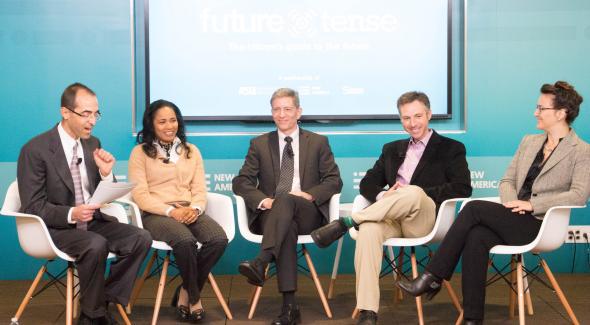It’s been almost 50 years since Richard Nixon announced his War on Cancer in 1971. After decades of funding research, training scientists and physicians, and treating millions of patients, we are still without a cure. Why is that?
On April 27, experts convened in Washington, D.C., for a live event—hosted by Future Tense, which is a partnership of Slate, New America, and Arizona State University—that evaluated what progress has been made in cancer research. They also explored how new approaches to understanding cancer will lead to better prevention, treatment, and care.
One of the themes of the day was that cancer researchers can learn a lot by thinking of the body as an ecological system. David Reese, the interim senior vice president of translational sciences and discovery research at Amgen, said, “Over the last half century we have devoted an enormous amount of effort to actually trying to understand cancer in the broader ecosystem of the body or the body’s ecology which has led us directly to where the most interesting developments are occurring in cancer research, like immuno-oncology or harnessing the body’s intrinsic immune system to fight cancer.”
That’s a critical point. “We’re all vulnerable to cancer because we are multicellular organisms,” said Athena Aktipis, assistant professor of psychology at Arizona State University and co-founder of the International Society for Evolution, Ecology and Cancer. “We are each made of 30 trillion cells that are cooperating with each other—coordinating cellular behavior—in order to make us all function.” But when there is a breakdown in the division of labor, like when some cells begin to exploit their environment by consuming resources faster than normal cells or dividing more quickly than they should, the body cannot function normally.
Over millions of years, our bodies evolved systems to detect and suppress cellular cheating—these are our cancer suppression systems. But evolution also favors those cheating individuals that can benefit from others’ altruistic behavior. Aktipis explains, “What that means is that we can’t completely ever escape from that vulnerability to cancer. But if we understand the evolutionary dynamics, the ecological dynamics, and how cooperation among cells helps support our health and wellbeing, we may be able to find new solutions to help us deal effectively with the problem of cancer.”
Joshua Schiffman, a professor in the department of pediatrics at the University of Utah and an investigator at the Huntsman Cancer Institute, is looking to other evolved species for inspiration. He pointed out, “There are animals that naturally avoid cancer. They have evolved over millions and millions of years to become cancer resistant.” Take elephants, for example. They are 100 times the size of people—instead of 30 trillion cells, they have 300 trillion. That many cells dividing over and over again during their 60- to 70-year lifetime, taking into account chance alone, means that elephants should be dying of cancer at a much higher rate than they do. But Schiffman and his collaborators have found that instead of two copies of the p53 gene, which in humans helps prevent cancer, elephants have 40 copies. Schiffman and his fellow researchers think that this helps keep elephants resistant to cancer—and it suggests that nature might have a prescription for how humans can avoid cancer.
Just as animals have had hundreds of millions of years to evolve different strategies for resisting cancer, so have humans. There is evidence of cancer in our pre-human ancestors dating as far back as 1.7 million years ago and in humans as early as 7000 B.C. Kate Hunt, a bioarchaeologist with 106 Group, analyzes human remains in an archeological context to identify ancient cases of cancer in order to build a collection of data that will help us better understand how cancer has evolved in humans over time. Learning exactly how cancer has evolved with humans over time is essential understanding how to combat it today.
This understanding also changes our notion of a cure. Our traditional goal is to eliminate every last cancer cell in the body, but Reese suggests we’re shifting more toward a notion of cancer control or a “functional cure.” He believes we can harness the immune system to attack enough cancerous cells to allow patients to live a long, natural life despite not being entirely cancer-free. Donna Marie Manasseh, the director of breast surgery at the Maimonides Breast Cancer Center in Brooklyn, says that her patients sometimes find this idea of living with cancer to be incomprehensible. The most common question she gets from patients, she says, is “Will I be cured?” That’s because patients are still socialized to believe cancer is a death sentence.
Jacob Brogan, a Slate contributor, discussed his own experience with cancer treatment, admitting, “I sometimes suspect that it was my relationship to the word cancer rather than my disease’s relationship to my body that horrified me most at the time.” Manasseh reinforced that this is common among her own patients. She said, “Cancer today is not a dirty word,” and we shouldn’t treat it as such. Instead, we need to talk about cancer in the open so people know what it is, how it’s treated, what to look for to catch it sooner, and to develop healthier ways of living to promote a strong immune system.
Although our best solutions may not be a cure per se, advances made over the last century suggest we will be able to live with cancer. Reese emphasized the reason for hope, saying, “There is no question in my mind that we’re at a watershed moment. I mean the things we’re doing now, when I was in training 20 years ago we couldn’t really have thought about doing and much of that is enabled by rapid advancements in technology; and 20 years from now things will be much different as well.”
Watch the full event on the New America website. Also in Slate:
“Why Cancer Isn’t Going Anywhere,” by Athena Aktipis
“How Dogs’ Sensitive Noses Could Change Cancer Diagnosis,” by Kathryn Bowers
